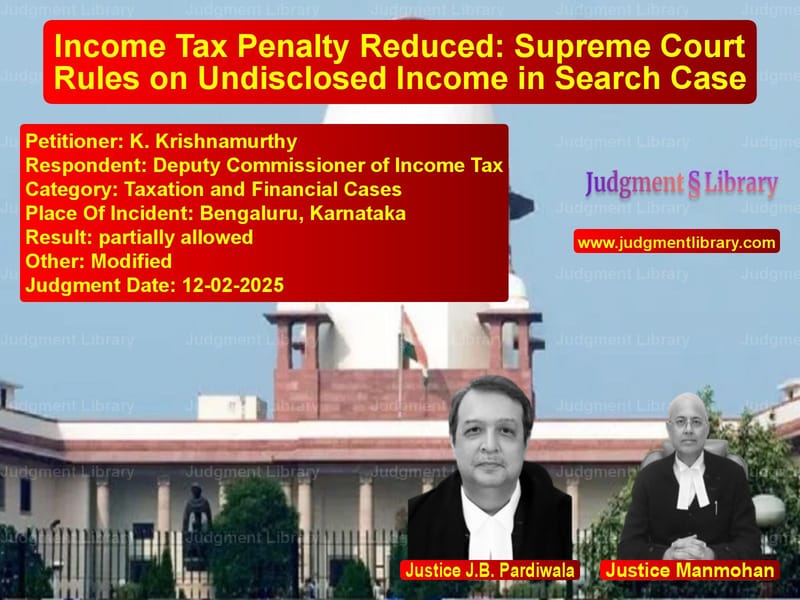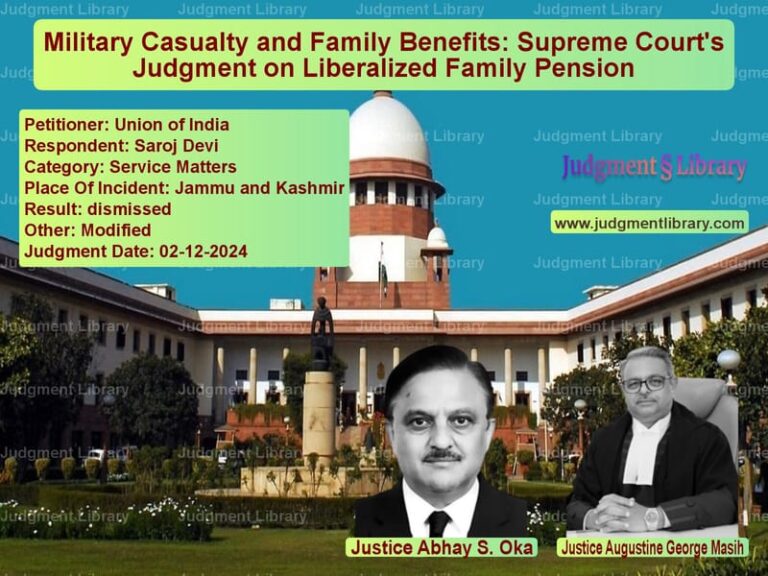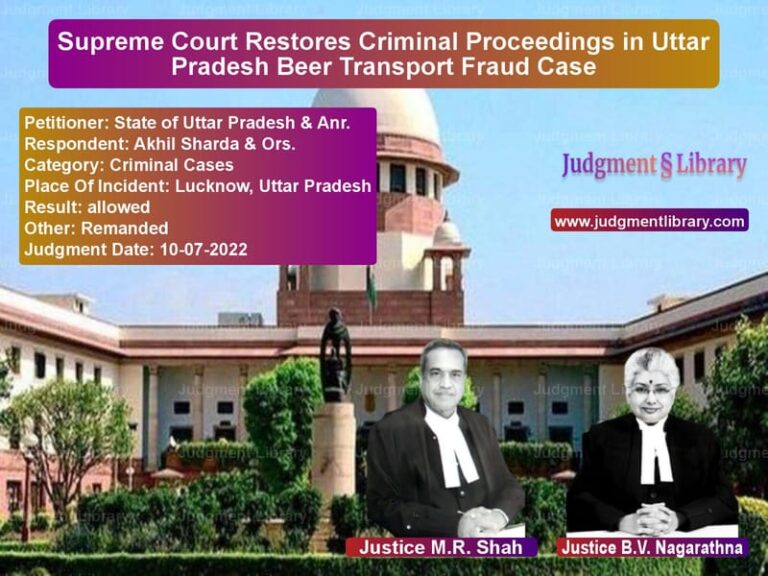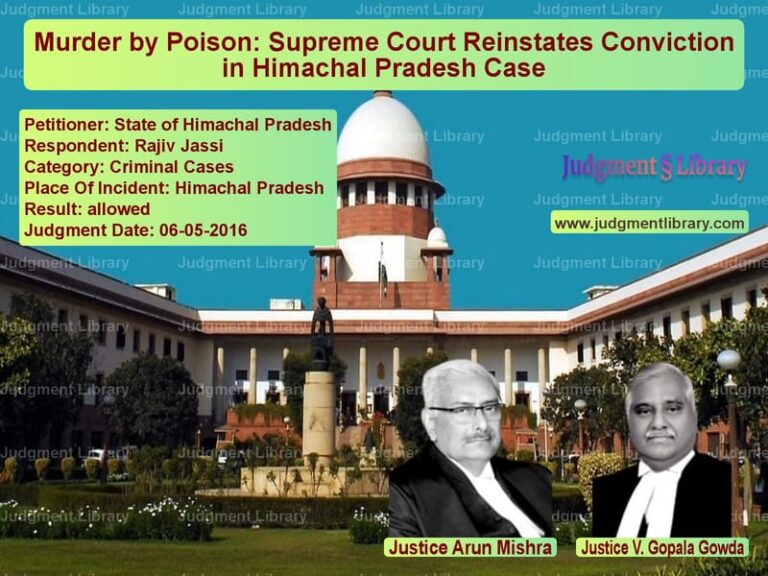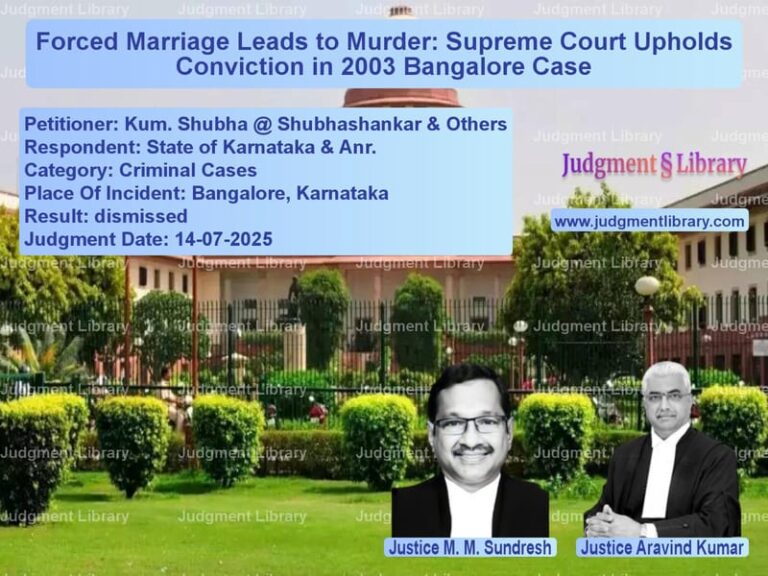Income Tax Penalty Reduced: Supreme Court Rules on Undisclosed Income in Search Case
The case of K. Krishnamurthy vs. Deputy Commissioner of Income Tax is a significant ruling where the Supreme Court clarified the applicability of Section 271AAA of the Income Tax Act, 1961, regarding the imposition of penalties on undisclosed income found during search operations. The Court ruled that while penalty was applicable on part of the income, it could not be levied on the entire amount as determined by the lower authorities.
The appeal was filed by the appellant, K. Krishnamurthy, against the Karnataka High Court’s decision, which upheld the penalty imposed by the Income Tax Department. The Supreme Court partially allowed the appeal, reducing the penalty liability.
Background of the Case
The dispute arose from a search and seizure operation conducted at the premises of the appellant on November 25, 2010. The search uncovered income not declared in tax returns, leading to tax assessments and subsequent penalties under Section 271AAA of the Income Tax Act.
Key details of the case:
- The appellant was involved in land procurement transactions through an MOU dated January 19, 2009, with a third party.
- During the search, the appellant admitted to an undisclosed income of Rs. 2,27,65,580 and later filed a return declaring total income of Rs. 4,78,02,616.
- The Income Tax Department imposed a penalty of 10% of the entire undisclosed income, amounting to Rs. 47,80,261.
Arguments Before the Court
Petitioner’s Arguments
The appellant’s counsel contended that:
- Penalty under Section 271AAA is not automatic and requires specific conditions to be met.
- The appellant had voluntarily admitted part of the income and paid taxes, which should exempt him from penalty under Section 271AAA(2).
- Only Rs. 2,27,65,580 was admitted as undisclosed income, and penalty should not be applied to the entire declared income of Rs. 4,78,02,616.
- The Income Tax authorities wrongly included land transactions of third parties in assessing the appellant’s undisclosed income.
Respondent’s Arguments
The Income Tax Department argued that:
- The search unearthed income that the appellant had not disclosed, justifying the penalty.
- The appellant did not fulfill all three conditions under Section 271AAA(2), particularly failing to pay taxes on time.
- Since part of the income was only disclosed during assessment proceedings and not during the search, penalty was rightly imposed.
Supreme Court’s Analysis
The Supreme Court analyzed the relevant provisions of Section 271AAA, stating:
“Penalty under this Section may be levied if there is undisclosed income in the specified previous year. However, the imposition of penalty is not mandatory.”
The Court emphasized that:
- Penalty is not automatic; the Assessing Officer must demonstrate the existence of undisclosed income.
- Conditions under Section 271AAA(2) should be applied reasonably, considering whether taxes were eventually paid.
- Documents obtained during the search must directly relate to the assessed income.
Final Judgment and Ruling
The Supreme Court ruled:
- Penalty should not be applied to Rs. 2,27,65,580, as the appellant had admitted and paid taxes on this amount.
- Penalty should be applied to Rs. 2,49,90,000, as this amount was disclosed only during assessment and not in the search.
- The appellant must pay a penalty of 10% on Rs. 2,49,90,000 instead of the entire Rs. 4,78,02,616.
Based on these findings, the Court modified the penalty order, stating:
“The present appeal is disposed of with a direction to the Appellant to pay penalty at the rate of 10% on Rs. 2,49,90,000 and not Rs. 4,78,02,616.”
Key Takeaways
This judgment clarifies several aspects of tax penalty law:
- Penalty under Section 271AAA is not automatic and depends on case-specific circumstances.
- If the assessee admits undisclosed income and pays taxes, penalty can be avoided under Section 271AAA(2).
- Land transactions not directly linked to the search cannot be arbitrarily included in undisclosed income.
- The Income Tax Department must establish that the income assessed falls within the definition of ‘undisclosed income’ under the law.
Conclusion
The Supreme Court’s decision in this case serves as an important precedent for tax penalty disputes. It reinforces the principle that while tax evasion must be penalized, the authorities must adhere to the conditions set out in law. The ruling also offers relief to taxpayers by ensuring penalties are imposed fairly and not automatically.
Read also: https://judgmentlibrary.com/taxation-on-lottery-distributors-supreme-court-ruling-explained/
Petitioner Name: K. Krishnamurthy.Respondent Name: Deputy Commissioner of Income Tax.Judgment By: Justice J.B. Pardiwala, Justice Manmohan.Place Of Incident: Bengaluru, Karnataka.Judgment Date: 12-02-2025.
Don’t miss out on the full details! Download the complete judgment in PDF format below and gain valuable insights instantly!
Download Judgment: k.-krishnamurthy-vs-deputy-commissioner-supreme-court-of-india-judgment-dated-12-02-2025.pdf
Directly Download Judgment: Directly download this Judgment
See all petitions in Income Tax Disputes
See all petitions in Tax Evasion Cases
See all petitions in Tax Refund Disputes
See all petitions in Banking Regulations
See all petitions in Judgment by J.B. Pardiwala
See all petitions in Judgment by Manmohan
See all petitions in partially allowed
See all petitions in Modified
See all petitions in supreme court of India judgments February 2025
See all petitions in 2025 judgments
See all posts in Taxation and Financial Cases Category
See all allowed petitions in Taxation and Financial Cases Category
See all Dismissed petitions in Taxation and Financial Cases Category
See all partially allowed petitions in Taxation and Financial Cases Category

